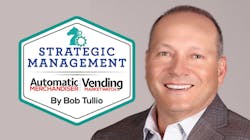There is one thing that micro market operators can count on when their clients begin to repopulate offices in a meaningful way. As the old saying goes, “there will be plenty of cooks in the kitchen.” Operators will be dealing with office managers, facility managers, HR managers, even top executives. All will be focused on two priorities: employee safety and employee happiness.
Take a proactive approach
It will be critical for operators to take a proactive approach, especially from a design standpoint. Markets that are worn out, made with wire shelves or other materials that are difficult to clean, or assembled without any special design consideration will not only be vulnerable to competition, but vulnerable to extinction.
Beyond keeping their employees safe, businesses are deeply concerned about liability and may encourage employees to work from home.
“Liability is a huge issue, which is why business groups are lobbying for protection from liability pertaining to COVID-19,” said Andrew Valdivia, area president at Arthur J. Gallagher & Co. “For businesses, it is a potentially scary situation.”
Valdivia added that employers must do everything they can to limit the risk of infection in their workplace, which only puts added pressure on micro market operators.
Step One: Initiate the conversation
“The first thing that every operator needs to do is talk to their client and ask them what they need to see to be comfortable with their micro market moving forward,” said Steve Orlando, co-founder of Fixturelite, the leading supplier of micro market retail displays, seating and design features. “That is the beginning of the process and it is a process that needs to be initiated by the operator.”
Once a client defines their concerns and spells out their objectives, a micro market operator can begin outlining a plan that addresses design, traffic flow, sanitization, signage, cleanliness and touch-free options.
Step Two: Take control, communicate plans, be flexible
C. J. Recher, vice president of Five Star Food Service, said communication with clients is critical. “Our field management staff is in constant communication with clients determining how we can best serve them and care for their employees safely. That is our highest priority,” he said. Recher added that his company is communicating in person, via memos, their website and social media.
Arthur Siller, vice president of Evergreen Refreshments, said his company makes good use of signage to support their efforts.
“In our client’s locations, we have put procedures in place pertaining to sanitization of any equipment [and] have minimized client and field visits,” he said. “But, at the same time, we are being as transparent as possible with signage relating to contactless payment systems and our sanitization schedules.”
Step Three: Implement Solutions
A complete market redesign might be part of the plan and the discussion regarding that redesign will probably happen via video conference with all the aforementioned “cooks in the kitchen.” For this conversation, operators will need to be prepared.
“The Fixturelite Design Tool is perfect for a Zoom call,” said Orlando. “Put it on a shared screen and present the design options in a professional way. This is how micro markets are sold today.”
For the micro market client who wants to maximize touchless surfaces, micro market payment apps are gaining support.
“Operators need to keep up with technology if they plan to survive,” said Steve Closser, co-founder of Translucent, the industry’s leading micro market consulting firm. “Apps are gaining acceptance like never before, especially as offices repopulate.”
Everything is “on the table”
Since there is no “pandemic playbook,” there are plenty of options open to discussion, including the possibility of adding an attendant to a micro market — either a shared cost or paid for entirely by the client. Andrew Barrett Weiss, a “workplace experience manager” who has implemented some lavish employee amenity programs at Edmunds.com and his current company, GoodRx, said that bringing in an attendant is being seen by many facility managers as a possible best practice.
“We want to supply plenty of amenities,” said Barret Weiss. “What gets lost in the mix and the whole discussion about safety is one important question: Are we taking care of our employees?”
Numerous micro market operators are helping their clients show appreciation to their employees by making micro market gift card coupons and vouchers available. “Everything is on the table,” said Barret Weiss. “We are looking for solutions that will keep our people safe and happy.”
About the Author

Bob Tullio
Bob Tullio is a content specialist, speaker, sales trainer, consultant and contributing editor of Automatic Merchandiser and VendingMarketWatch.com. He advises entrepreneurs on how to build a successful business from the ground up. He specializes in helping suppliers connect with operators in the convenience services industry — coffee service, vending, micro markets and pantry service specifically. He can be reached at 818-261-1758 and [email protected]. Tullio welcomes your feedback.
Subscribe to Automatic Merchandiser’s new podcast, Vending & OCS Nation, which Tullio hosts. Each episode is designed to make your business more profitable.
